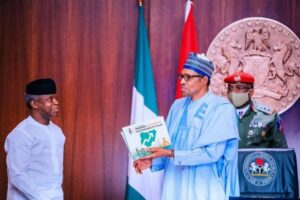
As the battle to cushion the effects of the COVID 19 pandemic continues in every part of the world, different measures are employed by world powers to mitigate its effects depending on their strengths and capabilities. Some governments have prioritised stabilising their stock markets while others are addressing the key public health concerns. What is evident is that the pandemic has proven to be the greatest challenge in recent human history.

Surprisingly, the economies of the advanced countries in the world have been hit the hardest by the pandemic. Stock values plummeted in the worst recorded falls. The banking industry and global value chains have been disrupted, resulting in a global economic crisis. In a nutshell, the corona virus has exposed the vulnerability of the global economy.
Let me begin this properly by asking one big relevant question. How is Nigeria faring in the face of this global economic quagmire?
In response to the threat of severe economic downturn as visible from other nations that were already grappling with the economic effects of COVID-19, President Muhammadu Buhari, on the 30th of March, 2020, constituted a crisis committee headed by the Hon. Minister of Finance, Budget and National Planning to look at what the impact of the corona pandemic might be on the budget and the economy.
The committee which was later called the Economic sustainability Committee (ESC) and chaired by VP Osinbajo. It comprised of several Cabinet Ministers as well as the Group Managing Director of the NNPC and the Governor of the Central Bank of Nigeria (CBN).

The primary aim of the ESC was to develop a precise and strategic Economic Sustainability Plan, suggest new policy measures and interventions, provide a Fiscal/Monetary Stimulus Package, including support to private businesses (with emphasis on strategic sectors most affected by the pandemic) and vulnerable segments of the population. One could only surmise that this quick and timely proactive measure by the Nigerian government gave credence to its seriousness in tackling one of our biggest economic challenges in history.
The VP Osinbajo led ESC team set out to work in what looked like a very critical assignment with due diligence and commitment. Several consultations were made and memoranda issued. The synergy among the Members of the Presidential Economic Advisory Council, the 36 State Governors and Leadership of the National Assembly was also strengthened. All hands were on deck as Nigeria’s economic survival was at stake.
As hours of numerous meetings and consultations chameleoned into days, and then weeks, the Osinbajo chaired ESC team arrived at an antidote to bring the nation out of the economic mess. The committee designed a plan; The National Economic Sustainability Plan (NESP) which was submitted to President Buhari on June 11th, 2020. On the occasion of the presentation of the Economic Sustainability Plan to the president, the Vice President remarked “We are confident that if the proposals are taken as a whole and implemented conscientiously, Nigeria will avert the worst of the impending economic headwinds, and covert this crisis to a victory for the Nigerian economy”.
The Economic Sustainability Plan has 11 key components that are sophisticated enough to drive the economy through the turbulent waters of the COVID-19 pandemic. Amongst the components are Self reliance, Mass Agricultural Programme, Job creation, Public works & Road Construction Programme, Mass Housing Programme, Support for local production & manufacturing, Installation of solar home system and lot more.

The Economic Sustainability Plan consists of two major pillars. One is to create jobs and the second aims to inject cash into the economy. These will be achieved through targeted investments in agriculture and agro-processing, manufacturing, renewable energy, housing and information technology. The plan which includes cash transfers for medium and small scale enterprises is also remarkable by its emphasis on the use of local contents to support its initiatives which automatically means producing what we eat and consuming what we produce.
The Economic Sustainability Plan proposes the creation of 5 million jobs within 12 months by bringing 20,000 – 100,000 hectares of land per state into cultivation. The private sector is expected to drive the process as suggested by the VP.
More intriguing part of the plan which has received massive commendations is the creation of the solar energy project. The plan proposes supplying 5 million Nigerian households (or about 25 million individuals) with solar energy. It requires that solar power equipment be produced in Nigeria.
It is also pertinent to mention that the economic plan features creation of 1.8 million jobs specifically through the construction of 300,000 homes (400 in each local government area) engaging young professionals and artisans who form themselves into small and medium scale businesses within the construction industry, using indigenous labour and materials. The Ministry of Works and Housing is tasked with its implementation.
Going by the impact this plan will have on the Nigerian people if finally implemented, one is left to ponder and appreciate Prof. Osinbajo’s usefulness in this administration. Despite the limited executive functions of his office, he has made himself a fulcrum that balances complex things in this government. His patriotism, commitment and the urge to get things done has earned him the country’s chief economic expert. He has succeeded in establishing different polices that are masses oriented and beneficial to the general public.
Unlike previous Vice Presidents Nigeria has had, Prof. Osinbajo has won the trust of the President and the masses alike with his integrity, leadership skills, patriotism and passion for a better nation.
On the occasion of 62nd birthday anniversary of Vice President Yemi Osinbajo, March 8 2019, President Muhammadu Buhari described his relationship with his deputy as one of a special bond. “Osinbajo has diligently championed the values of setting the foundation for the peace, progress and stability of the country by working very hard to build a resilient economy, while promoting transparency and accountability.” he said.
Beyond a shadow of doubt, the Economic Sustainability Plan designed by the Osinbajo led ESC team is the blueprint for economic recovery and sustainability during and post COVID-19 era. The “think Osinbajo vote Buhari campaign” strategy of 2015 is still so much in play. The formidable partnership of the duo led President Muhammadu Buhari designating his deputy, Vice President Yemi Osinbajo to supervise the overall implementation of the N2.3 trillion project in what seems like the biggest project in the nation’s history.




